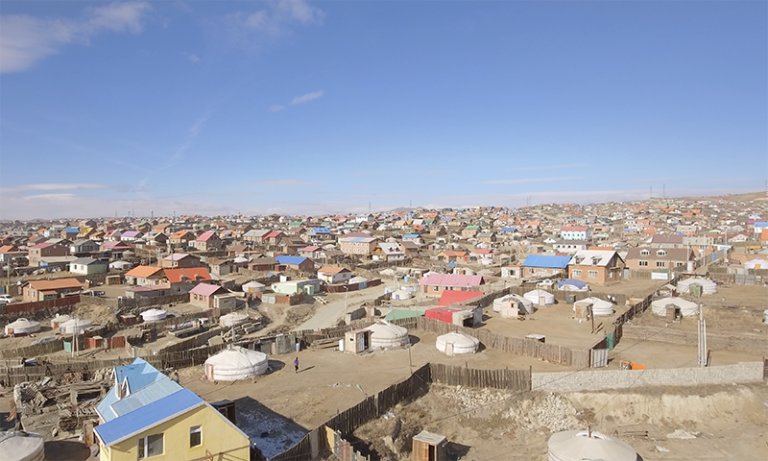27 August – 1 September 2018 in collaboration with Badruun Gardi and Enkhjin Batjargal (GerHub)

Ulaanbaatar, the capital city of Mongolia is home to almost half the country’s total 3 million inhabitants. Over the past 25 years, Ulaanbaatar’s population has doubled due to the rapid rate of migration of former nomadic herders into the city. For a country that has maintained a nomadic herding culture for centuries, living in an urban environment is a brand new phenomenon that presents infrastructural, political, and social problems. Nomadism, however, keeps being deeply entrenched within Mongolia’s culture and tradition and plays a prominent role in shaping the everyday life of Ulaanbaatar and its inhabitants.
Ulaanbaatar is composed of two sheerly distinct urban forms: the centrally located apartment areas and the unplanned ger areas that encircle the city. Ger is the Mongolian word for the traditional round, felt-covered dwelling used by nomadic herders. Ger areas are semi-formal, largely unplanned urban settlements of Ulaanbaatar, characterized by a severe lack of social and physical infrastructure – including central heating, running water, indoor plumbing and sewer connections, schools, and hospitals. Today, nearly 60% of Ulaanbaatar residents live in the ger areas: although household income may vary, the vast majority of the urban poor live in the such areas. While the ger is the dominant form of housing for newcomers, simple detached houses have also become a common form of housing in the ger areas.
Ger areas are actually Ulaanbaatar’s original form or urban settlement, as the city’s history starts as a mobile monastery town, precisely consisting of gers. However, gers have not adapted well as a sedentary structure. Ulaanbaatar is the coldest capital city in the world with temperatures dipping to -40°C in the winter. With only a layer or two of traditional felt as insulation, the ger loses heat rapidly. Residents burn raw, unrefined coal throughout the winter months to survive. This has turned Ulaanbaatar into one of the most air polluted cities in the world, if not the most polluted one.
The summerLab will focus on identifying ways to re-imagine the ger areas. What kind of lessons can we learn from the comparative analysis of nomadic and sedentary lifestyles? What kind of thresholds and intersections can we identify? How can ger areas optimise the usage of existing infrastructure? How can we envision spaces to improve community cohesion?
Participants will learn from a variety of experts on Ulaanbaatar and Mongolia as well as interact with ger area residents. Participants will spend the majority of the time in Ulaanbaatar but will take an overnight trip out of the city to visit herder families and to understand their cultural background and their contemporary way of dwelling. In the last two days, participants will develop their strategic vision for a future transformation of the ger district, that will bear in mind both current urban challenges and historically rooted narratives of the area. Such visions will be presented to local residents and a wider series of urban stakeholders, with the aim of fostering a final collective discussion.
Click here to download the application form or write to us at dpusummerlab@ucl.ac.uk to express your interest. Further information will be provided in due course. Stay tuned and follow our Facebook page for updates!
Application and fees
The DPU summerLab is open to all students and professionals with an interest in urban environments.
- Fees
- The international participation fee for each workshop is £375 (early-bird discounted rate) or £425 (standard rate). The fee is discounted to £275 (early-bird rate) or £325 for: currently enrolled DPU students (2016-17), DPU alumni, and group applications (5 people or more). Discounted fees apply for participants intending to register to multiple workshops too, please contact us for further info. If you wish to submit a group application (five people or more), please use the ‘group application form’ instead (you can find this below in the ‘Applications’ section). Please note these fees do not include travel or accommodation, though advice and local information will be provided.
- Visas
Participants are responsible for obtaining any visa they might require to which the DPU can provide proof of workshop registration if needed.
- Personal equipment
Participants will need to bring their own laptops and digital equipment. Please ensure that this equipment is covered by your own insurance as the DPU cannot take responsibility for items lost or stolen during the workshop.
- Applications
The deadline for application for the 2018 series will be on Monday 2 July. The deadline for early-bird applicants is on Monday 4 June. The applicant will need to e-mail the form, along with a CV and a letter of motivation to dpusummerlab@ucl.ac.uk
 2018_application_form_individuals.docx
2018_application_form_individuals.docx
 Close
Close

